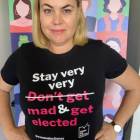
This is part five in a series. For the full series, go here.
In a sign of the times, during his earliest days in office in November this year, NSW Premier Dominic Perrottet acknowledged that there aren’t enough women in the Liberal Party and promised to promote more women in a reshuffle over summer and to encourage more women to run for pre-selection.
Around the same time, NSW Treasurer Matt Kean highlighted the number of women in the workforce as critical to the state’s economic recovery from COVID’s ongoing fallout, saying: “For us to succeed as a state, we need to make sure that we have as many of our best and brightest people participating fully in our economy. That’s why we need to increase the participation rate for women in the workforce.”
They were promising statements from our newly-minted premier and treasurer, and hot on their heels was the report from sex discrimination commissioner Kate Jenkins confirming what we already know to be true: Australia is ready for more women of all backgrounds in office.
Perrottet has now increased the number of women in cabinet (seven, up from six under Gladys Berejiklian), but there is still much work to do.
To be clear, this issue does not affect the Liberal Party alone. Currently, women across all parties are under-represented at each level of government in Australia: they make up 37% of state and territory assemblies, 37% of federal Parliament, and 35% of local councils.
It’s not an abstract concept — when a seat becomes vacant, we need to have highly-qualified female politicians from diverse backgrounds available to run for it, and to vote for them when they do. Every single election matters, from local councillors to the federal seats.
Why do we need more women and diversity in office? In a nutshell: increased bipartisanship, more investment in essential public infrastructure, the myriad benefits of intersectionality, different styles of leadership throughout crises, value demonstrated over and over again.
I’ve spent a lot of time working with women in regional and rural Australia in recent times. It is clear to me that women’s leadership, care and organisational skills hold those communities together — especially through times of crisis. We saw it during the bushfires, during droughts and then floods, and during the pandemic.
It might be Meals on Wheels, running the local life-saving club, leading business chambers, carrying the tin around to get drought relief.
Those skills — those volunteer jobs that they’re already doing — replicate nine-tenths of what a good political representative exhibits. These women are out in the community. They see what needs to be done. And they do it.
As we see every day at Women for Election (WFE), change is afoot. We’ve had 1900 women register for our non-partisan events in the past 12 months, up from 200 in 2019. A new era of leadership is on the rise. It’s been bubbling away in our communities for a long time and it’s time to welcome a new type of power.
Having worked with many women leaders over the years, I know countless aspiring female politicians have these qualities in spades. They can help change the face of power in Australia for the better, across all levels of government and across the political spectrum.
Gender parity and diversity in office isn’t about an abstract concept of fairness; it’s about whether Australia wants a future as an economic and social powerhouse.
That future will be shaped by decisions made today; we all know that decisions are made by those who show up, so now we need more women showing up for office at all levels of government, and for voters to support them. The lived experience of women — more than half our population — must be part of the problem-solving and decision-making at the highest levels to ensure better societal outcomes for all Australians.
Every strong democracy has strong leadership — and great strength and power comes from diversity. We have an opportunity to create more balanced and diverse parliaments and council chambers to reflect the flourishing democracy we enjoy. It’s time to take a huge leap forward and change the face of power in Australia.








Perhaps we should be focusing on competency rather than on some chromosomal trait. A lot of women I talk to are not interested in this sexist balancing, nor are they interested in politics of any sort. It seems it is a cry for balancing incompetence, incompetent females should equal incompetent males, now there is a case for that.
Diversity is a BS argument – diversity of what ?sexes [which ones];, religions , racial features etc – It should be diversity of experience
Competency at what, though? Our current politicians are competent to be where they are, or they wouldn’t be there. Maybe we should have a jury system in which arguments for and against a law are put to a 12 person random jury, which then retires to consider their decision. It’d be cheap.
sort of representative plebiscite ? who do envisage making the original law?
Different jury for each proposed law. Do youse notice how I’m solution driven? Middle name Cassandra, but. Nobody listens.
‘Competent to be where they are’ – I’m wondering whether that’s meant to be a joke.
It is said that people get the governments they deserve, if you are prepared to put up with the lies, corruption, unethical behaviour, ideological pseudo religious would be dictatorship or authoritarianism that the two party system imposes so be it.
“A lot of women I talk to are not interested in this sexist balancing”, thats my experience too and there in is the rub. If less of one gender is interested in pursuing something, is it right that the genders are balanced 50 50? Shouldnt it be relative to the level of interest and experience?
Reminds me of a journalist in Vic who asked a 2 departmental secretaries about gender equity. The first had a higher proportion of males and said they practiced affirmative action in recruiting to achieve diversity. The second departmental secretary had an overwhelming proportion of women and said they recruit the best applicant.
I’m not passing judgment on either arrangement, but shouldnt it be one rule for all?
Wishing to be a politician should be an automatic ban. I favour a lottery selection. 100 winners, with 51 of them having to plan long term, and looking 75 years ahead. They’d be the oldest 51. The election lottery to be held every 5 years on the first of April, my birthday. Everyone eligible to vote would be in the lottery. How about it?
Because if you keep on doing the same old thing you get the same old result.
I think there is a lot of merit in plebiscites but then who is going to stop the popularists ruining the country passing only things that are, you know, popular. There is a huge case for it wrt euthanasia, decriminalizing drugs, lobbyists, etc, but what happens when they start asking “who supports a $1000 grant to people for Christmas”, “who wants to pay less taxes”. Look at the mess USA is in.
What happens when the random parliamentarians vote against more refugees or affirmative action?
Hey that was my idea from a decade ago. Agreed, if you want to vote, you have to be prepared to lead.
Bit of a weasel going on here using total percentages and blandly asserting “all parties” are at fault. Huge gap between Labor and LNP on gender.
The male-dominated federal liberal party has become a misogynistic corrupt boys club . For women to succeed they have had to play by the rules set by the alleged men.
Bring on the “voices of” women
You’d think Soroptimists would be encouraging women to run in as many electorates as possible.
it’s surprising the number of women who have never heard of the suffragettes, or the second wave feminists that fought for the equal opportunity legislation that women benefit from today.
The simple question, “are you are feminist?” Yeah, nah, I learnt to not ask that question. I like my testicles where they are thanks.
We need a way to break the stranglehold that the two party system imposes on us but we don’t need more Bronwyn Bishops, Michaela Cashes etc. etc. etc.
When the advocates of ‘gender equality ‘ wake up to the reality that a lot of women vote for, work with or for and donate to the likes of trump and the LNP we might get some reality in this debate rather than the head in the sand attitude that seems embodied in the idea that if we don’t acknowledge them they don’t exist.